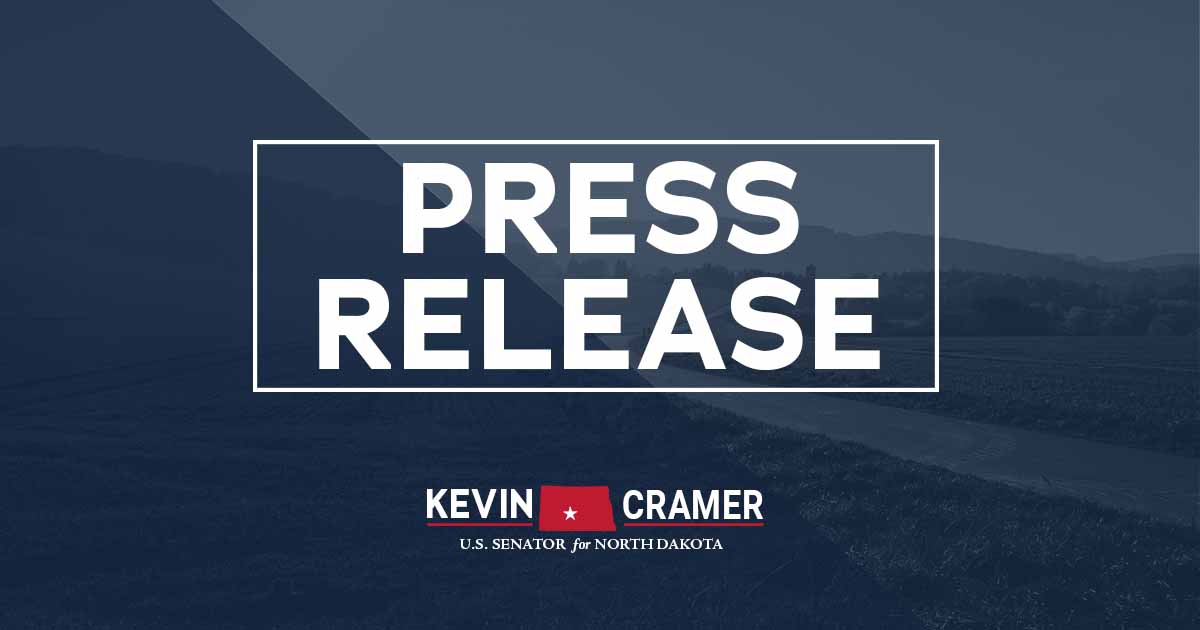Source: United States Senator Kevin Cramer (R-ND)
WASHINGTON – U.S. Senator Kevin Cramer (R-ND) joined Senators Mike Rounds (R-SD) and John Hoeven (R-ND) in introducing legislation that would reform the Natural Resources Conservation Service (NRCS) within the United States Department of Agriculture (USDA). The NRCS Wetland Compliance and Appeals Reform Act would safeguard farmers, ranchers and landowners from bureaucratic overreach by the NRCS and empower them to continue to protect their land as they see fit.
“In North and South Dakota, we are all too familiar with the punitive enforcement of conservation compliance and farmers and private property rights rarely come out on top. Our bill provides much-needed reforms for the Natural Resources Conservation Service wetland determinations. It creates a more thorough appeals process, prohibits bureaucrats from being retroactively punitive, and rightly places the burden of proof on the government as opposed to the landowner. I thank Senator Rounds for his leadership and look forward to working with him on these reforms,” said Senator Cramer.
“South Dakota’s farmers, ranchers and landowners know their land better than anyone else,” said Senator Rounds. “They are conservationists by nature and want their land to be productive for future generations. They don’t need the heavy-hand of government interfering with their ability to manage the land they live and work on.”
“North Dakota farmers and ranchers take care of their land better than anyone else,” said Senator Hoeven. “This legislation is about ensuring USDA NRCS policies are farmer-friendly and respect property rights. As we get to work on the next farm bill, we will continue to prioritize efforts to reduce bureaucratic overreach and red tape for landowners.”
Once considered wasteland, wetlands were often drained so farmers could plant crops. Growing concern over the loss and appreciation of the value of wetlands in the ecological system led Congress to take action to protect wetlands in the 1985 Farm Bill. However, today, because penalties from violating NRCS compliance rules can lead to the loss of USDA services and assistance for farmers, it is vitally important that the NRCS compliance rules are fair, reasonable and within congressional intent.
The NRCS Wetland Compliance and Appeals Reform Act is endorsed by the American Farm Bureau Federation.
“Farmers and ranchers are committed to caring for the land they’ve been entrusted with,” said American Farm Bureau Federation President Zippy Duvall. “We understand the importance of following environmental rules, but those rules should be enforced fairly. AFBF has been outspoken in calling for changes to conservation compliance programs, and the NRCS Wetland Compliance and Appeals Reform Act is a step in the right direction.”
The NRCS Wetland Compliance and Appeals Reform Act:
- Prohibits NRCS from entering into permanent easement agreements, only allowing termed easements.
- Makes certain compliance penalties for newly determined wetlands can only be prospective.
- Places the burden of proof on NRCS to prove a violation (i.e. not on the farmer/landowner to prove innocence).
- Prohibits NRCS from changing rationales for wetland determinations.
- Requires NRCS to go through notice and comment rulemaking for conservation compliance, essentially banning the use of interim rulemaking.
- Updates NRCS’ appeals process to:
- Retrain National Appeals Division (NAD) judges and agency directors in how to provide a fair and balanced hearing;
- Require USDA to provide the entire record and/or decisional documentation to the farmer/landowner at the time of alleged compliance violation;
- Allow the farmer/landowner (and their counsel) to call NRCS technical staff as witnesses in the appeal;
- Accept evidence provided by the farmer/landowner as true absent substantial evidence to the contrary;
- Compensate the farmer/landowner for legal fees if they are successful in the appeal.
- Requires USDA to establish State Oversight Committees (for each state) that will oversee the appeals of wetland determinations within their state.
- Requires USDA to develop an appeal process for redetermination requests NOT accepted by state NRCS offices.
- Prevents NRCS from using one-time observations to satisfy the hydraulic criteria for determinations.
- Removes all references to “woody vegetation” from 7 CFR 12.2 and 12.32.
- Creates a Customer Satisfaction Survey carried out by an independent survey provider.
Click here for bill text.
